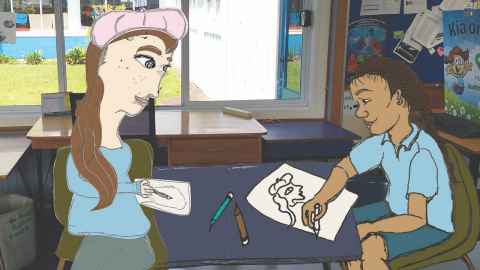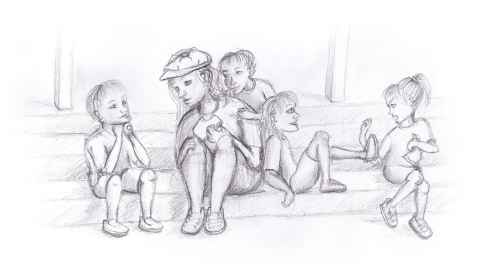Best thesis places children as participants in their own health
12 April 2019
Dr Julie Spray spent a year back at primary school for her PhD in Anthropology, which has been awarded a Vice-Chancellor's Prize for Best Doctoral Thesis in 2018.

Julie's thesis explores how children experience, understand and participate in their health. To answer her questions about how children help to shape their own wellbeing, she completed a year of fieldwork in a school with children aged between 8–12, located in an area of South Auckland characterised by social marginalisation and material deprivation.
There are persistent inequities in Aotearoa New Zealand childhoods, which concentrate in the intersection of class and ethnicity. One manifestation of these inequities is the disproportionate burden of acute and chronic illness for Māori and Pasifika children, particularly those living in low socio-economic areas.
Julie used a research method called participant observation, meaning that she did what the children participating in her research were doing, as well as watching them. "I went to school every day and did maths and handwriting alongside the kids. I was basically like a big kid. I played soccer, made friends and also interviewed kids about their lives and their families and their experiences."
The current approach to health policy in Aotearoa New Zealand usually treats children as passive recipients of care, rather than active members of society who engage with services on their own terms. Julie's findings suggest ways to elevate children's perspectives and activities without giving them sole responsibility for their own health status.
"Our society tends to be quite adult-centric, so we see kids as kind of 'people in waiting', that we cordon off. We're concerned about the adults that they're going to turn into, but don't really see them as full members of society."
I went to school every day and did maths and handwriting alongside the kids. I was basically like a big kid. I played soccer, made friends and also interviewed kids about their lives and their families and their experiences.
A major focus of her research was on current government-led initiatives around rheumatic fever, which include sending out messages that sore throats can kill, and putting sore throat clinics into schools. Julie says that "the success of these interventions can really hinge on how kids perceive them and what they do with them, but that isn't really taken into account in policy at all."
She is full of praise for the staff at the sore throat clinic at the school she worked in, but noted that they were bewildered by the volume of children presenting with sore throats.
Julie's time with the children themselves highlighted how anxious posters featuring scary messaging and relatable—often recognisable—children were making the children she was working with. It also challenged the underlying assumption that children have the same understanding of what a sore throat is as adults, when they would often go to the clinic after yelling too much at lunch time or eating scratchy food.

Julie says that she has never done anything remotely as challenging as completing a PhD, and that this award is a validation of years of hard work.
"It was like climbing up a mountain that I didn't know I was going to be able to climb up until I got to the top, but then there's another mountain and I didn't know if I was going to be able to climb up that one. And it just went on like that for four years until suddenly I reached the top of a mountain and there wasn’t another mountain in front of me!"
Julie was co-supervised by Associate Professor Susanna Trnka and Professor Judith Littleton, and funded by a University of Auckland Doctoral Scholarship. She says that her co-supervisors complemented each other with their different disciplinary backgrounds, and their commitment to rigour and clarity.
Our society tends to be quite adult-centric, so we see kids as kind of 'people in waiting', that we cordon off. We're concerned about the adults that they're going to turn into, but don't really see them as full members of society.
Julie credits the majority of her success in this award to her supervisors and colleagues in Anthropology. She says that the writing groups that she took part in to collaboratively review drafts of each other's writing were particularly helpful, especially because they included both postgraduate students and academic staff.
"It role models really well for everyone that even faculty go through this process. Their first draft isn't perfect and they get criticism and model how to receive it. I think that was a real learning experience."
Julie is currently building her academic career as a research fellow in Population Health at the University of Auckland and teaching Anthropology at the University of Waikato. Her doctoral research is being published as a book by Rutgers University Press.
"I can't really see myself doing anything else. I really love research and I also really love teaching, so it seems like I was made for academia."
Media queries
Julianne Evans | Media adviser
Tel: 923 6589
Mob: 027 562 5868
Email: julianne.evans@auckland.ac.nz